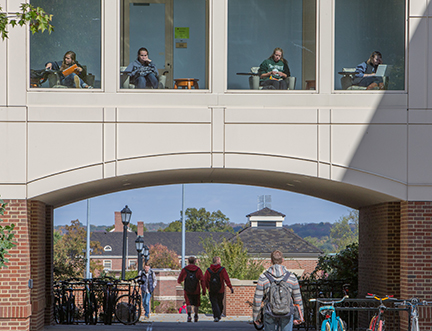
Two Miami computer science courses recognized as "exemplars"
Written by Susan Meikle, university news and communications, meiklesb@MiamiOH.edu.
Two courses in Miami University's College of Engineering and Computing are recognized as "exemplar" in the recently released CS2013 — computer science curriculum guidelines that form the basis for most college-level computer science curricula worldwide.

The archway connecting Benton and Garland Halls, home of Miami's College of Engineering and Computing (photo by Scott Kissell).
The ACM (Association for Computing Machinery) and the IEEE Computer Society last month released the jointly developed new curriculum guidelines for undergraduate degree programs. The new guidelines represent a comprehensive revision of the previous 2008 version.
CS2013 takes a "big tent" view of computing, fostering integration of computing with other disciplines.
One new feature of the 2013 report is a collection of 69 “exemplary” course syllabi, intended to help computer science professors around the world develop new courses to implement the curriculum guidelines, according to the CS2013 Joint Task Force.
Miami's exemplar courses — both in computer science and software engineering — are Technology, Ethics and Global Society (CSE 262), developed and taught by Bo Brinkman and currently taught by Valerie Cross (both associate professors); and Data Abstraction and Data Structures (CSE 274), taught by Gerald Gannod, professor.
They "have been included as model courses for the new standard used by most, if not all, computer science programs globally," Gannod said.
They also follow the "big tent" view, integrating computing with other disciplines.
Technology, Ethics and Global Society (CSE262)
This course offers inquiry into a wide range of information technology issues, from moral responsibilities affecting professionals to wider ethical concerns associated with information technology in day-to-day living.
It is required for computer science and/or software engineering majors, but it is open to all majors; the only prerequisite is one semester of college writing/composition.
"Opening the course to non-computing majors has significantly increased the diversity of the course's audience, " Brinkman said. "This benefits the students because it allows the instructor to demonstrate and highlight ethical clashes that arise when people from different academic disciplines try to work together."
Brinkman is also technical director of Miami's Augmented Reality Center, graduate director of computer science and software engineering and affiliate faculty of interactive media studies. His research interests include computer ethics, augmented reality and algorithms.
Data Abstraction and Data Structures (CSE 274)
"This course is being used as an exemplar of how we incorporate communication outcomes into the core curriculum," Gannod said. "As such, the course description looks very much like other courses for data structures, and the real difference is in the execution of the course and how the communication skills are integrated into the assignments."
It is taught using the inverted classroom model: students view videos online prior to coming to class and then work on programming assignments in class. Communication is taught as an integrated part of the technical content.
"In particular, communication is taught in the context of the workplace scenarios that emphasize situated learning," Gannod said.
This exemplar demonstrates the results of an NSF-funded collaborative project between Miami and North Carolina State University. The project emphasizes integration of communication outcomes across the entire curriculum. (Learn more at the project's website.)

The College of Engineering and Computing recently celebrated "Engineers Week" with events including Engineering Showcase Day, above (photo by Jeff Sabo).
This course is taught by Gannod, who is also director of the Miami University Mobile Learning Center.
CS2013: international curricular guidelines for undergraduate programs in computing
Beginning more than 40 years ago with the publication of Curriculum 68, the major professional societies in computing — ACM and IEEE-Computer Society — have sponsored various efforts to establish international curricular guidelines for undergraduate programs in computing.
As the field has grown and diversified, so too have the recommendations for curricula. These volumes are updated regularly with the aim of keeping computing curricula modern and relevant.
